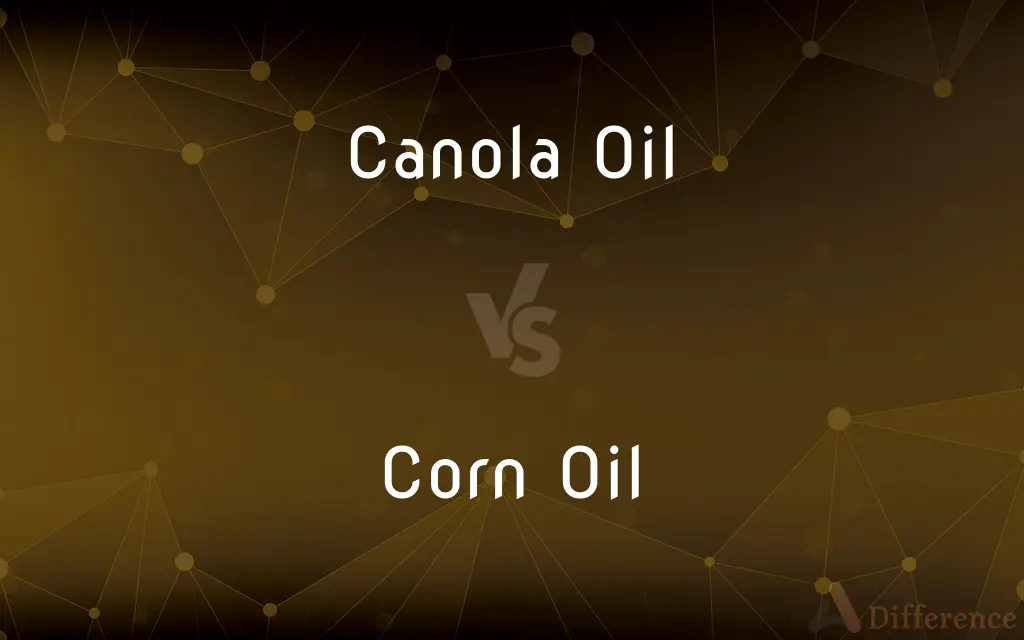Canola Oil vs. Corn Oil — What's the Difference?
Edited by Tayyaba Rehman — By Fiza Rafique — Published on December 16, 2023
Canola Oil is derived from rapeseed plants, while Corn Oil is extracted from corn kernels; both are commonly used in cooking.

Difference Between Canola Oil and Corn Oil
Table of Contents
ADVERTISEMENT
Key Differences
Canola Oil is sourced from the seeds of the canola plant, which is a type of rapeseed. In contrast, Corn Oil is procured from the germ of corn kernels. Both oils are staple ingredients in many kitchens due to their versatility.
In terms of health, Canola Oil is often noted for its lower saturated fat content compared to other cooking oils, making it a popular choice for heart-healthy diets. Corn Oil, on the other hand, has a higher polyunsaturated fat content, which can be beneficial for cholesterol levels.
When it comes to cooking, both Canola Oil and Corn Oil have relatively high smoke points, meaning they can withstand higher cooking temperatures without breaking down. However, the flavors of the two oils can differ, with Canola Oil having a more neutral taste and Corn Oil offering a slight nutty flavor.
Cost can also factor into the choice between Canola Oil and Corn Oil. Depending on the region and availability, the price of Canola Oil might differ from that of Corn Oil, although both are generally affordable options for everyday cooking.
For those with dietary restrictions or preferences, it's worth noting that while Canola Oil is often non-GMO, Corn Oil may be derived from genetically modified corn, unless specified otherwise on the label.
ADVERTISEMENT
Comparison Chart
Source
Derived from rapeseed plants.
Extracted from corn kernels.
Health Benefits
Lower saturated fat content.
Higher polyunsaturated fat content.
Flavor
Neutral taste, suitable for varied dishes.
Slightly nutty flavor.
Smoke Point
High, good for frying and sautéing.
High, ideal for frying.
GMO Concern
Generally non-GMO unless otherwise stated.
Often derived from GMO corn unless labeled non-GMO.
Compare with Definitions
Canola Oil
Canola Oil has a high tolerance to heat.
When searing meat, she chooses Canola Oil for its stability.
Corn Oil
Corn Oil is often used in frying due to its high smoke point.
With Corn Oil, she could fry at higher temperatures without smoking.
Canola Oil
Canola Oil possesses a neutral flavor, making it versatile.
For baking, she prefers Canola Oil because it doesn't alter the taste.
Corn Oil
Corn Oil is known for its slight nutty taste.
He noticed the distinct taste of Corn Oil in the stir-fry.
Canola Oil
Canola Oil is recognized for its low saturated fat content.
Doctors recommend Canola Oil for a heart-healthy diet.
Corn Oil
Corn Oil is rich in polyunsaturated fats.
For those watching cholesterol, Corn Oil can be a suitable option.
Canola Oil
Canola Oil is a vegetable oil derived from rapeseed.
She uses Canola Oil for frying due to its high smoke point.
Corn Oil
Corn Oil is an edible oil extracted from the germ of corn kernels.
Corn Oil is her go-to for deep frying because of its flavor.
Canola Oil
Canola Oil is often utilized in both cooking and baking.
Her salad dressing is made with Canola Oil for a light taste.
Corn Oil
Corn Oil has a golden-yellow hue.
The golden color of the Corn Oil added a nice touch to the dish.
Common Curiosities
Can I use Canola Oil for frying?
Yes, Canola Oil has a high smoke point, making it suitable for frying.
How is Corn Oil produced?
Corn Oil is extracted from the germ of corn kernels.
Which oil is considered healthier, Canola Oil or Corn Oil?
Both have health benefits. Canola Oil has lower saturated fat, while Corn Oil has higher polyunsaturated fat.
Are there GMO concerns with these oils?
Canola Oil is often non-GMO, while Corn Oil may come from GMO corn unless labeled otherwise.
What is the primary source of Canola Oil?
Canola Oil is derived from the seeds of the canola plant, a type of rapeseed.
Which oil is more affordable?
Prices can vary by region, but both are generally affordable cooking oil options.
Can I use Corn Oil in baking?
Yes, Corn Oil's flavor can complement many baked goods.
Which oil has a more neutral flavor?
Canola Oil has a more neutral flavor, while Corn Oil has a slight nutty taste.
Which oil is better for heart health?
Both have benefits, but Canola Oil's lower saturated fat content is often highlighted for heart health.
How should I store Canola Oil and Corn Oil?
Both oils should be stored in a cool, dark place, preferably in a sealed container.
Share Your Discovery

Previous Comparison
Amide Bond vs. Peptide Bond
Next Comparison
Graded Potential vs. Action PotentialAuthor Spotlight
Written by
Fiza RafiqueFiza Rafique is a skilled content writer at AskDifference.com, where she meticulously refines and enhances written pieces. Drawing from her vast editorial expertise, Fiza ensures clarity, accuracy, and precision in every article. Passionate about language, she continually seeks to elevate the quality of content for readers worldwide.
Edited by
Tayyaba RehmanTayyaba Rehman is a distinguished writer, currently serving as a primary contributor to askdifference.com. As a researcher in semantics and etymology, Tayyaba's passion for the complexity of languages and their distinctions has found a perfect home on the platform. Tayyaba delves into the intricacies of language, distinguishing between commonly confused words and phrases, thereby providing clarity for readers worldwide.











































